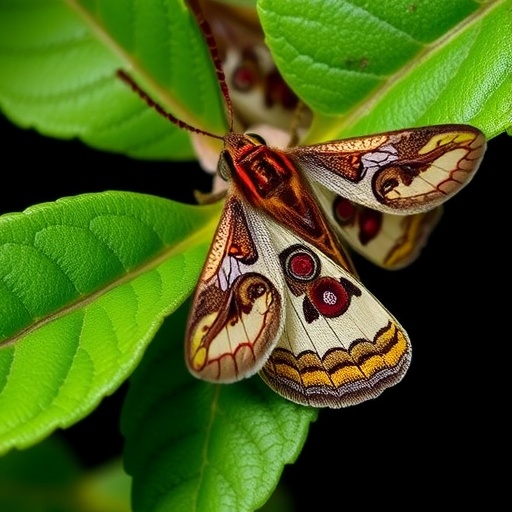As agricultural biotechnology advances, there exists a growing interest in eco-friendly pest management strategies. The use of chemical pesticides has long been the norm, but their adverse environmental effects have sparked a shift in focus towards more sustainable alternatives. In this context, the researchers sought to uncover the potential of bacterial species that inhabit the Asian walnut moth, aiming to leverage their properties in controlling walnut pests. Through meticulous isolation and characterization of these bacteria, the team has set a precedent for future research in biocontrol agents derived from insect-associated microorganisms.
One of the principal aims of the study was to ascertain the specific characteristics of bacteria harbored within the gut microbiota of Erschoviella musculana. These bacteria, which have adapted to exploit the unique biochemical environment of the moth’s digestive system, are believed to possess properties conducive to pest control. The researchers employed advanced techniques in molecular biology and microbiology to identify and categorize different bacterial strains, revealing a rich diversity of microbial life residing within these insects. This significant finding indicates that moth-associated bacteria may hold untapped potential for enhancing pest management strategies in agriculture.
.adsslot_0KNBSHMObX{width:728px !important;height:90px !important;}
@media(max-width:1199px){ .adsslot_0KNBSHMObX{width:468px !important;height:60px !important;}
}
@media(max-width:767px){ .adsslot_0KNBSHMObX{width:320px !important;height:50px !important;}
}
ADVERTISEMENT
The methodological framework of the research involved rigorous experimentation to assess the efficacy of the isolated bacterial strains in pathogenicity against several walnut pests. The researchers conducted a series of bioassays that assessed bacterial interactions with common walnut pests, documenting their impact on pest populations. Preliminary results suggested that certain strains displayed remarkable biocontrol abilities by effectively suppressing pest growth and development. This points towards a promising avenue for developing a biopesticide derived from these beneficial bacteria that can be employed in walnut orchards.
The study’s findings open new avenues for research into how we can further optimize biocontrol strategies using insect-associated bacteria. While the current results are promising, they also call for an expanded investigation of various strain interactions and their mechanisms of action. Through careful genomics studies and ecological assessments, scientists will continue to unveil the complex relationships between these microorganisms and their hosts. Such insights could eventually lead to tailored biocontrol solutions that are specific to certain pest species while ensuring a minimal ecological footprint.
Furthermore, enhancing our understanding of the microbiomes of pest organisms like the Asian walnut moth can provide critical insights into mitigating future pest outbreaks. As climate change progresses and ecosystems undergo rapid changes, monitoring and leveraging insect microbiomes will become increasingly essential in maintaining agricultural productivity. Bacteria residing within pest species could serve as an index of vulnerability and resistance, guiding farmers in their strategic responses to imminent crises.
As researchers build upon these findings, collaboration with agricultural stakeholders will be paramount. Farms, which are often on the frontlines of pest infestations, will need accessibility to new biocontrol solutions. Close partnerships between scientists and farmers can yield innovative applications of these bacteria in real-world scenarios, bridging the gap between research and practical deployment. Stakeholders in the agricultural sectors must remain engaged in dialogue with researchers to understand and adopt these cutting-edge biocontrol techniques effectively.
Through this pioneering research, the potential for a biocontrol revolution in the walnut industry appears brighter than ever. By recognizing and utilizing the symbiotic relationships within our ecosystems, we can develop innovative solutions that promote sustainability and biodiversity in agriculture, ultimately reshaping the future of pest management.
Subject of Research: Biocontrol potential of bacteria associated with the Asian walnut moth
Article Title: Biocontrol potential of bacteria associated with Asian walnut moth Erschoviella musculana Erschoff (Lepidoptera: Nolidae) on walnut pests
Article References:
Şalvarci, H.B., Gencer, D., Eski, A. et al. Biocontrol potential of bacteria associated with Asian walnut moth Erschoviella musculana Erschoff (Lepidoptera: Nolidae) on walnut pests.
Int Microbiol (2025). https://doi.org/10.1007/s10123-025-00674-3
Image Credits: AI Generated
DOI: https://doi.org/10.1007/s10123-025-00674-3
Keywords: Biocontrol, Agricultural sustainability, Walnut pest management, Micribial ecology, Eco-friendly pesticides.
Tags: agricultural biotechnology advancementsAsian walnut moth researchbacterial biocontrol methodsbiocontrol agents from bacteriaeco-friendly pest control strategiesenvironmental impact of pesticidesinsect-associated microorganismspest infestation solutionspest management in orchardssustainable agriculture innovationswalnut industry challengeswalnut moth pest management





